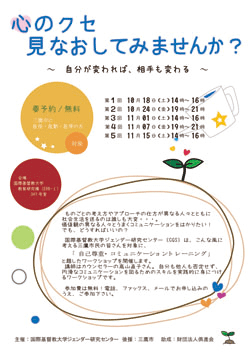Takako NIWA
Graduate Student, ICU
【The article below is the same as the article that appears in the ???th issue of the CGS Newsletter.】

As a CGS staff member who participated in the CGS-hosted workshop "Developing Self-Esteem and Communication Skills," I would like to report on this event. The workshop series continued over 5 sessions, the titles of which were as follows:
(1) Turn Your Weaknesses into Strengths
(2) Dealing with Stress
(3) Skills in Positive Speaking
(4) Understanding Anger
(5) Dealing with Harassment and Improving Communication Skills at Work
The event drew more applicants than expected, and while this pleased me as a member of the planning committee, it also made me see how so many people were worried about their interpersonal relationships. I felt that the difficulties of living in the contemporary were being pushed under my nose again.
It seemed that many of the applicants were attracted to the subtitle of the workshops, "Let's Take a Look at Your Mental Habits." What exactly is a "mental habit"? According to a definition in the Daijirin dictionary, a "habit" is an "action frequently taken by an individual unconsciously, or without their knowledge." Talking to the participants, there are individual differences in where you draw lines, such as between what "can be forgiven" and what "cannot be forgiven." The decision-making, frame of mind, and reaction toward these things are often reflexive. According to the lecturer Ms. Naoko Takayama, just by being aware that one has these mental habits makes an unexpectedly large difference.
Take, for example, the all too common concern that saying "no" might make one appear cold to others. There are a surprising number of people who feel deep down that they "must accept a person whenever and wherever possible" once they become involved with someone. However, when carefully considered, obviously there is no one single person who can do this at all times and in all situations or places. This fact, which is only to be expected (once you have a calm mind), tells us the truth in the opposite light. In other words, "there is no one who can be accepted by others at each and every time." To be unaware of this truth, and continue to live in a win-lose world where there are only the two choices of "accepting" or "rejecting," can be extremely painful. However, this may be a simple "habit" of the mind.
According to Ms. Takayama, in between "accepting" and "rejecting" there is another point ? a state in which you listen, but do not necessarily accept a request. In other words, we have the third option of respecting the other person's feelings even if we cannot accept their actions or demands. To understand this is synonymous to realizing that, even if our actions are not accepted, there is the possibility that our feelings might be.
height="354" />Because we don't have to accept everything, in reverse, it means that we do not have to reject everything just because there is a part that cannot be accepted. With this in mind, developing relationships with others may become a more relaxed activity. Our own emotions become much easier to deal with if we can distance ourselves from the two choices of rejecting (oppressing) or accepting (exploding) anger (for example) into understanding. Our own changes will rub off onto those around us. If we can change, we can change others. This small difference might gradually change the world. To wish so may be naive, but this workshop ignited this hope inside my heart.
